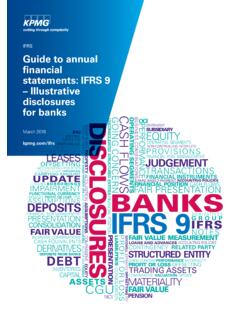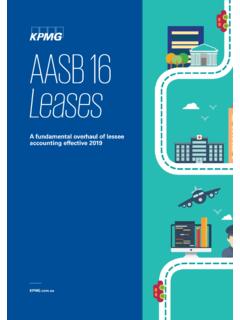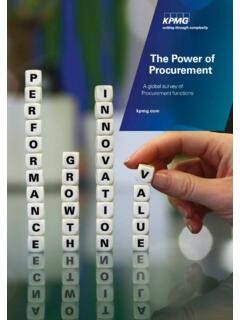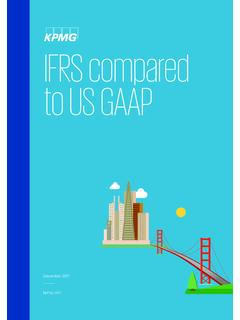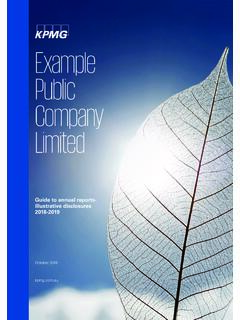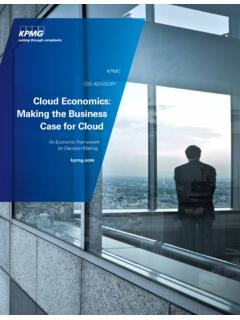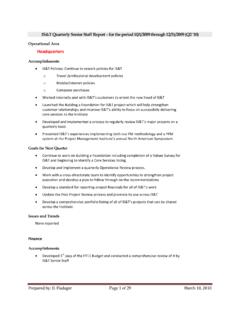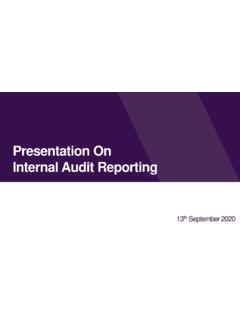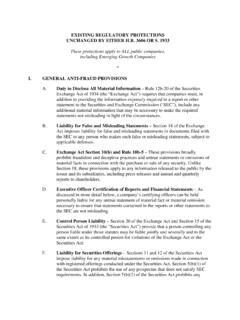Transcription of ICAI releases revised guidance on Internal Financial ...
1 2015 KPMG, an Indian Registered Partnership and a member firm of the KPMG network of independent member firms affiliated with KPMG International Cooperative ( KPMG International ), a Swiss entity. All rights reserved. BackgroundUnder Section 143(3)(i) of the Companies Act, 2013 (2013 Act), an auditor of a company is required to state in his/her audit report whether the company has an adequate Internal Financial controls (IFC) system in place and the operating effectiveness of such controls. Explanation to Section 134(5)(e) of the 2013 Act defines IFC to include policies and procedures adopted by the company for ensuring orderly and efficient conduct of its business, accuracy and completeness of the accounting records, and timely preparation of reliable Financial Institute of Chartered Accountants of India (ICAI) had issued a guidance Note in November 2014.
2 This guidance Note has been revised subsequently and the ICAI issued a revised guidance Note on audit of Internal Financial Controls Over Financial Reporting ( guidance Note) on 14 September 2015. This issue of first Notes provides an overview of the guidance Note issued by September 2015 first Notes on: Financial ReportingCorporate law updatesRegulatory and other informationDisclosuresRelevant to:AllAudit committeeCFOO thersSector:AllBanking and InsuranceInformation, Communication, EntertainmentConsumer and Industrial MarketsInfrastructure and GovernmentFIRST NOTESKPMG in IndiaICAI releases revised guidance on Internal Financial Controls Over Financial ReportingTransition:ImmediatelyWithin the next 3 monthsPost 3 months but within 6 monthsPost 6 months1 Reporting responsibility of the management Section 134(5)(e) of the 2013 Act (which deals with the directors responsibility statement) requires directors of listed companies to state whether they had laid down IFC to be followed by the company and that such IFC are adequate and were operating effectively.
3 Rule 8(5)(viii) of the Companies (Accounts) Rules, 2014 (Rules) requires Board s report of every company to state the details in respect of adequacy of IFC with reference to the Financial statements. Though not specifically mentioned, the guidance Note appears to suggest that for: Listed companies: The directors responsibility statement to state that IFC are adequate and operating effectively. The Board s report to state the adequacy of IFC with respect to Financial statements. Other companies: The Board s report to state adequacy of IFC with respect to Financial statements. 2015 KPMG, an Indian Registered Partnership and a member firm of the KPMG network of independent member firms affiliated with KPMG International Cooperative ( KPMG International ), a Swiss entity.
4 All rights reserved. first Notes 16 September 20152 Criteria to be considered for developing, establishing and reporting on IFC Similar to the 2013 Act, the guidance Note does not prescribe a particular framework for IFC. Instead the guidance Note states that a benchmark system of Internal control, based on suitable criteria, is essential to enable the management and auditors to assess and state the adequacy and compliance of the system of Internal controls. In the Indian context, Appendix I Internal Control Components of Standards on Auditing (SA) 315 -Identifying and Assessing the Risk of Material Misstatement Through Understanding An Entity and Its Environment, provides the necessary criteria for IFC over Financial reporting (IFC FR) for companies.
5 The components of Internal controls under SA 315 takes into account control environment, entity's risk assessment process, control activities, information system and communication and monitoring of by auditors whether same scope as that of management The auditor s objective in an audit of IFC FR (which is generally carried out along with an audit of Financial statements) is to express an opinion on the adequacy and operating effectiveness of the company s IFC FR. A company s Internal control cannot be considered effective if one or more material weakness exists. Paragraph A1 of SA 200 -Overall Objectives of the Independent Auditor and the Conduct of an audit in Accordance with Standards on Auditing,inter alia,states that the auditor s opinion on the Financial statements does not assure, for example, the future viability of the entity nor the efficiency or effectiveness with which the management has conducted the affairs of the entity.
6 Globally also, auditor s reporting on Internal controls is together with the reporting on Financial statements and such Internal controls reported upon relate only to Internal controls over Financial reporting. The guidance Note states that consistent with the requirements of the 2013 Act and the Rules as well as the practice prevalent globally, the term IFC wherever used in the guidance Note in the context of the responsibility of the auditor for reporting on such controls under Section 143(3)(i) of the 2013 Act, per se implies and relates to IFC FR. For the above purpose, the guidance Note defines IFC FR to mean a process designed by, or under the supervision of, the company s principal executive and principal Financial officers, or persons performing similar functions, and effected by the company s board of directors, management, and other personnel, to provide reasonable assurance regarding the reliability of Financial reporting and the preparation of Financial statements for external purposes in accordance with Generally Accepted Accounting to audit IFC FR Since the SAs do not address the auditing requirements for reporting on IFC, though certain portions of the SAs may still be relevant.
7 The guidance Note provides supplementary procedures that would need to be considered by the auditor for planning, performing and reporting in an audit of IFC FR under Section 143(3)(i) of 2013 Act. The guidance Note specifically states that since the audit of IFC is in connection with Financial reporting, the concept of materiality will be applicable even in such audits. The auditor should use the same materiality considerations as would be used in planning the audit of the company s annual Financial statements as provided in SA 320 -Materiality in Planning and Performing an the audit procedures mentioned in the guidance Note have been framed for an auditor, these procedures could also be used by companies to perform a self-evaluation.
8 The audit procedures would typically involve the following steps: Step 1 Planning: Under the planning stage, the auditor is required to establish an overall audit strategy that sets the scope, timing and direction of the audit , and that guides the development of the audit plan. The planning stage involves identification of significant account balances/disclosure items, identification and understanding significant flow of transactions, identification of Risk of Material Misstatements (RoMM), identification of controls which will address RoMM including applications, associated IT environment and general IT controls. Step 2 Design and implementation: The auditor should test the design effectiveness of controls by determining whether the company s controls, if they are operated as prescribed by persons possessing the necessary authority and competence to perform the control effectively, satisfy the company's control objectives and can effectively prevent or detect errors or fraud that could result in material misstatements in the Financial statements.
9 Step 3 Operating effectiveness: Operating effectiveness of a control is tested by determining whether the control is operating as designed and whether the person performing the control possesses the necessary authority and competence to perform the control effectively. Testing of operating effectiveness involves planning the nature, timing and extent of procedures to be performed, assessing findings and concluding on operating effectiveness. 2015 KPMG, an Indian Registered Partnership and a member firm of the KPMG network of independent member firms affiliated with KPMG International Cooperative ( KPMG International ), a Swiss entity. All rights reserved. first Notes 16 September 20153 Step 4 Reporting: Where there are deficiencies that, individually or in combination, result in one or more material weaknesses, the auditor should evaluate the need to express a modified opinion qualified or adverse on the company s IFC FR, unless there is a restriction on the scope of the engagement in which case the auditors should either disclaim the opinion or withdraw from the engagement.
10 The auditor should determine the effect of the modified opinion on IFC FR has on his opinion on the Financial statements. Additionally, the auditor should disclose whether his opinion on the Financial statements was affected by the modified opinion on IFC reporting on consolidated Financial statements (CFS) Section 129(4) of the 2013 Act states that provisions of the 2013 Act applicable to the preparation, adoption and audit of the Financial statements of a holding company shall, mutatis mutandis, apply to the CFS. A strict reading of this Section might indicate that the auditor will be required to report under Section 143(3)(i) of the 2013 Act on the adequacy and operating effectiveness of the IFC FR, even in the case of CFS.
